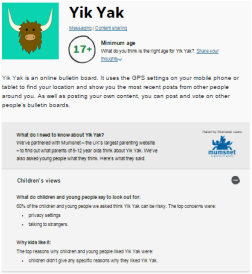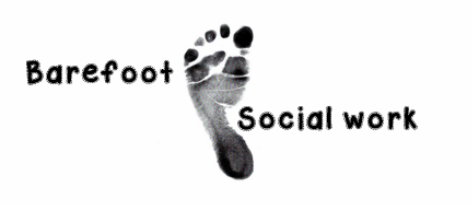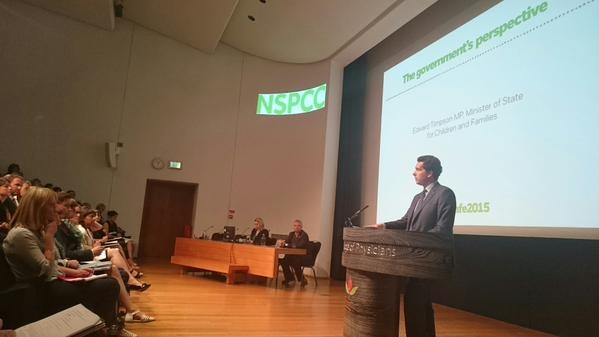|
Today Edward Timpson, Children and Families Minister, addressed the NSPCC conference about how social work reform and innovation can help better protect vulnerable children. He became a Member of Parliament in 2008 after winning a by-election in the constituency of Crewe and Nantwich. In September 2012, he was appointed as a Parliamentary Under-Secretary of State at the Department for Education, and following the 2015 general election, he was promoted to Minister of State for Children and Families.
You can see the whole speech here, but I've summarised/quoted the main points below. He started his speech with a little self-deprecation, saying how thrilled and surprised he was to be back in office, before drawing attention to his own upbringing, in a household with adopted and fostered siblings, and his work with children in care. He says he believes “the protection of vulnerable children… [is] the most profound responsibility we have as a society". He said that during the last parliament he had worked to “strengthen the child protection system… with major reforms to social worker recruitment and assessment”. Also “the first independent children’s trust in Doncaster”, he claimed, are “freeing up local authorities so that they can set up new models of delivery”. Child sexual abuse and NSPCC report Referring to investigations in Rotherham, Rochdale and Oxford he said: “we’ve been able to shine a light on a police and social care system set up to protect children, but that all too often turned them away, leaving them in the hands of callous abusers”. He also said that “the Prime Minister has appointed Karen Bradley as a minister in the Home Office to tackle [CSE] alongside [him] - recognition that child sexual abuse is about child protection... but also about prosecution too”. Centre of Expertise Timpson reported that a “new Centre of Expertise” will try “to understand what works when it comes to tackling and preventing child sexual abuse”. In addition, he acknowledged “that while CSE is dominating the media, we must not lose sight of neglect”. That’s why, he said, they’re “looking at having a campaign to encourage the public to report all forms of child abuse and neglect”. Social work reform “At the heart of good child protection is, of course, good social workers”. He said that “the introduction of a new assessment and accreditation system for children’s social workers” will offer “a rigorous means of assuring the public that social workers…have the knowledge and skills needed to do the job”. His department will also continue to support “projects to bring the brightest and best into social work through Step Up to Social Work and Frontline”. Innovation programme Timpson said that he was “especially keen to see much closer working between the voluntary sector and local authorities - something the Children’s Social Care Innovation programme is encouraging and seeing take root.” There’s a “£1.2 million initiative with SCIE - The Social Care Institute for Excellence - that aims to help us learn better from serious case reviews (SCRs) and improve their quality, and which includes a pilot to improve how SCRs are commissioned”. There’s also a “£1 million funding for the NSPCC to introduce the New Orleans intervention model in south London - which aims to improve services for children under 5 who are in foster care because of maltreatment by promoting joint commissioning across children’s social work and CAMHS teams.” Character and resilience Timpson’s “brief has been extended to include character and resilience”, placing “a greater emphasis on helping children… develop the qualities and life skills that will give them a strong foundation for social life”. He told the audience of social care professionals that “there’s a need to get better and smarter about how we equip our sons and daughters with the attributes they need to find their feet today and truly flourish.” He concluded his speech by asserting that he is a “pragmatist and simply [wants] to do what’s best by and for children, wherever they are and whatever their circumstances.”
0 Comments
I've written a couple of posts recently about Protecting Young Children Online and Protecting Big Kids Online. I was thrilled at how many times they were viewed and shared (Thank you!) and I hope they have helped you to feel more confident in safeguarding your children in the digital age. Since I last posted I've found the new Fire HD Kids Edition. It has some great easy-to-use parental controls where you're able to manage usage limits, content access and educational goals, plus there's a 2 year worry free guarantee! It looks fab! Children’s apps and websites were in the news on privacy grounds earlier this week, after the UK’s Information Commissioner’s Office (ICO) announced a review of how these services collect data on their young users. It will form part of an international project, coordinated by the Global Privacy Enforcement Network, and will look at 50 websites and apps, particularly what information they collect from children, how that is explained, and what parental permission is sought. The websites and apps will include those specifically targeted at children, as well as those frequently used by them. So how can parents decide which sites, apps and games are appropriate? Today I was emailed about the NSPCC's updated Net Aware guide which helps parents to understand what their children are doing online and hopefully maintain open channels of communication. It's a huge database providing information on sites, apps and games. It tells you what it is, why kids like it and provides an age rating to help parents judge whether it's appropriate for their child. After having a look through the site I realised that I probably haven't heard of half of them before.  Research by the NSPCC earlier this year found that many parents have gaps in their online knowledge and don't talk about the right issues with their children. For example, Tinder, Facebook Messenger, Yik Yak and Snapchat were all rated as risky by children, with the main worry being talking to strangers. However, for the same sites the majority of parents did not recognise that the sites could enable adults to contact children. Although eight out of ten parents told the NSPCC that they knew what to say to their child to keep them safe online, only 28% had actually mentioned privacy settings to them and just 20% discussed location settings. One of the best ways of safeguarding your child online is to maintain open channels of communication. Here are my top tips:
Take a look at the NSPCC guide and let me know what you think. |
AuthorI'm a Qualified Children's Social Worker with a passion for safeguarding and family support in the UK. Archives
August 2016
Categories
All
|



